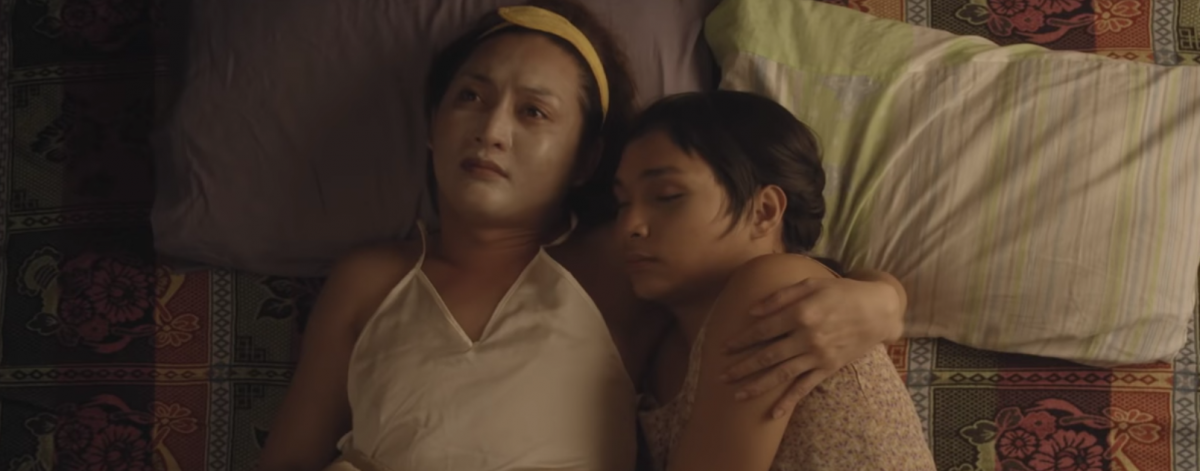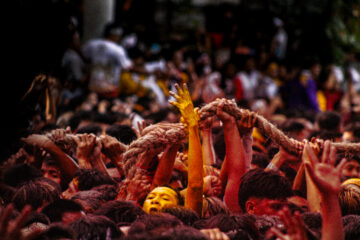By RYAN PIOLO U. VELUZ

ONCE the sun sets to take its respite, Mamu (Iyah Mina) faces the mirror and starts her usual routine: she highlights her face with cosmetics and dresses up to reveal her fair skin through seductive choices in apparel and various accessories. She then dominates the red-light district Fields Avenue in Angeles City, enticing flocks of foreigners to avail of her best product: her flesh.
Mamu (And a Mother Too) is the debut entry of director and LGBTQ+ rights advocate Rod Singh to this year’s Cinema One Originals film festival. The film discusses the sacrifices and hardships in the life of a middle-aged transgender woman who roams around the city in search of pleasure seekers to offer her services to as a sex worker.
Mamu’s life was simple and predictable until Vincent (Aaron Villaflor), her long-time partner, insisted on temporarily leaving her to seek a job in Cebu—an idea which she rejects adamantly. Mamu unexpectedly had to become the mother to her nephew, Bona (EJ Jallorina), a young teenage queer who is in the outset of discovering his own sexuality.
Through simplicity, the movie successfully reveals its strength and unique identity. Unlike other films, Mamu (And a Mother Too) conveys its story effectively without the aid of devices such as foreshadowing or flashbacks. Instead, by allowing the natural flow of events to take place and by proper execution of actions, an exposition of Mamu’s disposition, vulnerabilities, and triumphs are properly delivered, such as when she finally realizes that she was the deterrent to Vincent’s character development. However, it was also the moment when she proves her partner’s genuine love for her.
The film mines its narration from the gradual progression of each character; it has no abrupt and sudden transitions but it delicately strips the covers of the characters’ identities to reveal the humanity behind the misjudged and stereotyped image of the queer community. This is evident when Mamu showers generosity towards her friends and women of the same trade, an extended family of which she is considered the matriarch.
Singh’s realistic and sensitive directing transformed the antagonized world of the queer community, allowing the viewers to witness the reality by breaking the barriers and providing them with relatable instances. This instills within the audience the idea that, just like anyone else, queer people share the same dilemmas and aspirations in life as straight people and are just as worthy of respect and unconditional love.
Boldness and liberty are the banners of the film. This is shown through the unveiling of the bizarre experiences of Mamu, who endures the demands of her profession in order to provide the needs of her family. Sometimes, she even forgets about her own personal desires. The film does not concentrate on poverty, but it draws focus on how the characters portray the difficult exertions needed for human survival.
The audience may initially assume that queer films like Mamu (And a Mother Too) will contain generic comedy. However, through the actors’ commendable performances, none of the humorous scenes feel forced; instead, they are delivered as if they are simply a portion of people’s usual conversations. Despite the seriousness and grim features of some scenes, Mamu and her friends would draw out unexpected laughs from the audience through slapstick humor and witty exchanges of dialogue.
In her introductory role, Iyah Mina’s performance as Mamu is beyond commendable. Despite the ironic clash between her maidenly figure and manly voice, Mina successfully delivered authentic emotion through her graceful acting. The supporting cast, especially the mischievous and lustful yearnings of Bona for his friends, added color and diversity to the film.
Singh’s Mamu (And a Mother Too) is not a film with the newest perspective to tell its audience about what is behind the walls dimming the multihued lights of the queer community. Viewers can actually notice familiar storylines and milieus infused in the film. However, the film stands out through its modernized version of those narratives, creating a timely lens through which audiences can look to learn how to treat the LGBTQ+ community: with discernment and humility.
The film bravely tackles the true essence of being a woman by defying the standards set by society and creating a sturdy identity that cannot be distorted by the ill views of those who are still blinded by the misconstrued perspective of the past. Ultimately, the film teaches viewers that the core of being a mother is not determined by gender and blood relation; rather, motherhood is a choice fueled by unselfish motives and unpretentious affection.
Truly, Mamu is a mother, too. F



